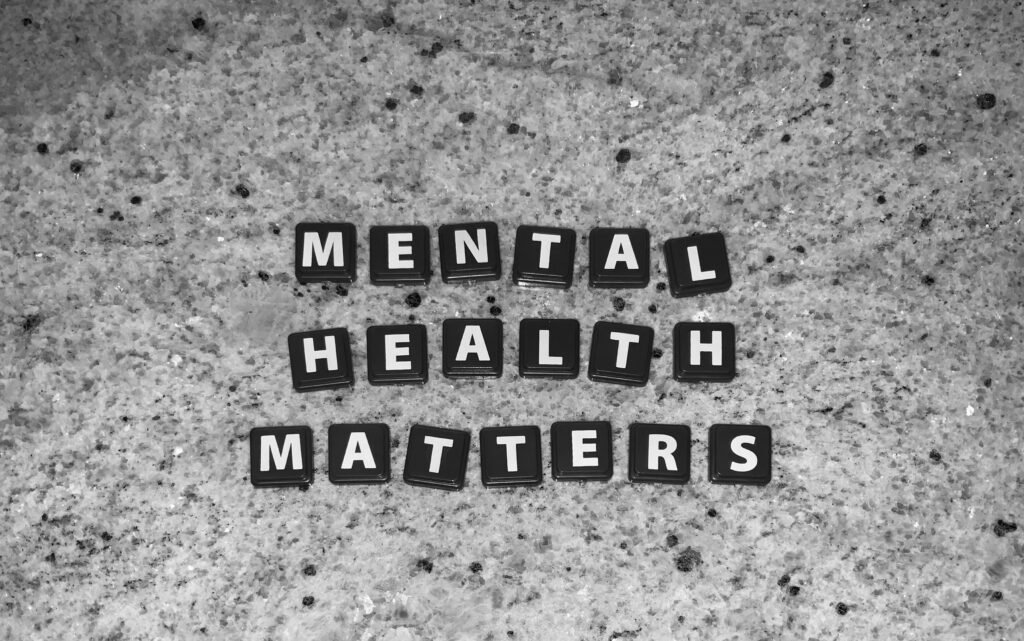You’re about to discover the incredible benefits that you can gain from using mental health services. From improved overall wellbeing to enhanced personal growth, these services can truly transform your life. Whether you’re seeking help for a specific mental health issue or simply looking to prioritize your emotional well-being, the support and guidance provided by mental health professionals can pave the way to a happier and healthier you. So, let’s explore the multitude of advantages that await you on this remarkable journey of self-care.

Read More Information at Health Joy
Improved Mental Well-being
Reduced symptoms of mental illness
Using mental health services can significantly contribute to the reduction of symptoms associated with mental illnesses. Whether you are dealing with anxiety, depression, or any other condition, seeking professional help can have a profound impact on your well-being. Mental health professionals are trained to assess, diagnose, and treat a wide range of mental illnesses. Through therapy, counseling, and medication management, these experts can offer targeted interventions to alleviate symptoms and promote a healthier mental state.
Increased self-esteem and self-confidence
One of the significant benefits of utilizing mental health services is the potential increase in self-esteem and self-confidence. Mental health professionals help you uncover underlying issues, challenge negative thoughts, and develop a more positive self-image. Through therapy, you can gain a better understanding of your strengths, values, and abilities, leading to increased self-esteem. As you develop healthier coping mechanisms and learn to overcome obstacles, your self-confidence can flourish, making you feel more secure and capable in various areas of your life.
Enhanced emotional resilience
Emotional resilience refers to the ability to adapt and bounce back from adversity. Mental health services can provide you with the tools and strategies needed to enhance your emotional resilience. Through therapy, you can learn effective coping mechanisms to manage stress, regulate emotions, and navigate challenging situations. The guidance and support from mental health professionals can help you develop a stronger sense of self, enabling you to face life’s ups and downs with greater inner strength and resilience.
Better Quality of Life
Improved relationships and social connections
Utilizing mental health services can significantly improve your relationships and social connections. Mental health professionals can help you develop healthier interpersonal skills, enhance communication techniques, and promote empathy and understanding. Through therapy, you can explore and address any relationship concerns or difficulties, fostering healthier connections with family, friends, and romantic partners. By working on your emotional well-being and understanding your own needs, you can foster more meaningful and satisfying relationships.
Enhanced work and academic performance
Taking care of your mental health through professional services can have a positive impact on your work and academic performance. Mental health issues can often affect concentration, motivation, and productivity. By addressing and managing these issues, mental health professionals can help you optimize your potential and perform at your best. They can assist you in developing strategies to improve focus, time management, and overall performance. Additionally, therapy can address any work-related stressors or challenges, providing you with the support and guidance needed to excel in your professional or academic endeavors.
Increased overall life satisfaction
When you prioritize your mental health by using professional services, you can experience increased overall life satisfaction. Mental health professionals can work with you to identify and address areas of dissatisfaction or unfulfillment in your life. Through therapy, they can help you set meaningful goals, explore your passions, and develop a greater sense of purpose. By improving your mental well-being, you can cultivate a more fulfilling and satisfying life, enhancing your overall happiness and well-being.

Read More Information at Health Joy
Effective Coping Strategies
Learning and practicing healthy coping mechanisms
One of the primary benefits of utilizing mental health services is the opportunity to learn and practice healthy coping mechanisms. Mental health professionals can teach you strategies and techniques to manage stress, anxiety, and other emotional challenges in a productive and constructive manner. These coping mechanisms may include deep breathing exercises, mindfulness practices, journaling, or engaging in physical activities. By developing healthier coping strategies, you can better navigate difficult situations, regulate your emotions, and effectively manage stress.
Improved stress management skills
Stress is an inevitable part of life, but how we handle it can significantly impact our well-being. Mental health services can help you improve your stress management skills by providing tools and techniques to effectively cope with stressors. These professionals can assist you in identifying the sources of stress in your life and guide you in developing healthy ways to manage and reduce it. Through therapy, you can gain a deeper understanding of your stress triggers and learn personalized strategies for managing stress, resulting in a more balanced and less overwhelming life.
Enhanced problem-solving abilities
Utilizing mental health services can enhance your problem-solving abilities. Mental health professionals can help you develop critical thinking skills, encourage creative problem-solving approaches, and assist in identifying alternative perspectives. Through therapy, you can gain insight into your patterns of thinking and behavior, empowering you to approach problems with a more insightful and solution-focused mindset. By improving your problem-solving abilities, you can effectively face challenges and find constructive resolutions, ultimately leading to a more fulfilling life.
Early Detection and Prevention
Identifying mental health issues at an early stage
Early detection of mental health issues is crucial for effective treatment and prevention of further complications. Mental health services can assist in identifying mental health concerns at their early stages, allowing for timely intervention. Mental health professionals are trained to recognize the signs and symptoms of various mental illnesses, ensuring that you receive appropriate support and treatment as early as possible. Early detection increases the likelihood of successful outcomes and minimizes the potential impact of mental health issues on your well-being and daily functioning.
Decreasing risk of future mental health problems
By utilizing mental health services, you can decrease the risk of future mental health problems. Addressing underlying issues and challenges early on can prevent them from escalating into more severe conditions. Mental health professionals can provide you with preventive strategies, coping mechanisms, and tools to safeguard your mental well-being. Through therapy and counseling, you can learn to recognize and manage potential triggers, develop healthy habits, and build resilience. Taking proactive steps to prioritize your mental health today can help prevent the development of future mental health issues.
Preventing worsening of existing conditions
If you are already living with a mental health condition, seeking professional help through mental health services can prevent the worsening of existing conditions. Mental health professionals can tailor treatment plans to address your specific needs and provide ongoing support to manage and stabilize your condition. Through therapy, medication management, and other interventions, they can help you effectively manage symptoms and prevent relapse. Early intervention and timely access to mental health services play a crucial role in preventing existing conditions from exacerbating and impacting your overall well-being.

Improved Physical Health
Reduced risk of chronic illnesses
Utilizing mental health services can contribute to a reduced risk of chronic physical illnesses. Mental health and physical health are closely interconnected, with poor mental health increasing the risk of developing chronic conditions such as cardiovascular disease, diabetes, and autoimmune disorders. By addressing and managing mental health concerns, mental health professionals can help reduce the likelihood of these physical health complications. Therapy and counseling can enhance stress management, promote healthier lifestyle choices, and support overall well-being, thereby reducing the risk of chronic illnesses.
Enhanced immune system function
Taking care of your mental health through professional services can have a positive impact on your immune system function. Chronic stress, anxiety, and depression can weaken the immune system, making individuals more susceptible to infections and illnesses. Mental health professionals can help you develop effective stress management strategies and coping mechanisms, which can strengthen your immune system. Therapy and counseling provide a safe space for emotional regulation, reducing the burden of chronic stress on your body and allowing your immune system to function optimally.
Better sleep and increased energy levels
Mental health issues often disrupt sleep patterns, leading to fatigue and reduced energy levels. However, utilizing mental health services can help improve your sleep quality and overall energy levels. Mental health professionals can identify and address underlying factors contributing to sleep disturbances, such as anxiety or insomnia. Through therapy, they can teach you relaxation techniques, stress reduction strategies, and healthy sleep habits, enabling you to achieve better quality sleep. Increased restfulness promotes physical restoration and rejuvenation, leading to higher energy levels and improved overall physical health.
Reduced Reliance on Substance Abuse
Increased likelihood of overcoming addictive behaviors
One significant benefit of utilizing mental health services is an increased likelihood of overcoming addictive behaviors. Mental health professionals are trained to provide specialized support and treatment for individuals struggling with substance abuse or addiction. Through therapy, they can help you understand the root causes of addiction, develop healthier coping mechanisms, and establish a solid foundation for recovery. Mental health services can provide you with the resources, support, and guidance necessary to break free from addictive behaviors and lead a fulfilling life in recovery.
Improved recovery outcomes for co-occurring disorders
Co-occurring disorders, also known as dual diagnosis, refers to the presence of both a mental health disorder and a substance use disorder. Mental health services play a crucial role in improving recovery outcomes for individuals with co-occurring disorders. Mental health professionals can offer integrated treatment, addressing both the mental health and substance abuse components simultaneously. By identifying and treating both disorders, they can promote long-term recovery, reduce the risk of relapse, and enhance overall well-being and quality of life.
Reduced temptation and triggers for substance abuse
Accessing mental health services can help reduce temptation and triggers for substance abuse. Mental health professionals can assist you in developing relapse prevention strategies, identifying high-risk situations, and building a strong support system. Through therapy, you can gain a better understanding of your unique triggers and vulnerabilities, enabling you to navigate challenging situations and maintain sobriety. Mental health services provide a safe and supportive environment where you can explore and overcome the underlying issues that contribute to substance abuse, minimizing the risk of relapse.
Professional Guidance and Support
Access to expert knowledge and skills
Utilizing mental health services provides access to expert knowledge and skills in the field of mental health. Mental health professionals have undergone extensive training and education, equipping them with the expertise to assess, diagnose, and treat various mental health issues. By seeking professional help, you benefit from the accumulated knowledge and experience of these experts. They can provide you with evidence-based interventions, personalized treatment plans, and specialized techniques to address your specific needs. Access to professional guidance ensures that you receive the most effective and appropriate support for your mental health concerns.
Building a trusting therapist-client relationship
One of the essential aspects of mental health services is the establishment of a trusting therapist-client relationship. Mental health professionals create a safe and non-judgmental space where you can openly discuss your thoughts, feelings, and concerns. Through regular therapy sessions, you develop a rapport with your therapist, fostering trust and a sense of security. This relationship forms the foundation for effective treatment, allowing you to explore deeper issues and work towards positive change. The supportive and collaborative nature of the therapist-client relationship ensures that you feel heard, validated, and respected throughout your mental health journey.
Validation and empathy for personal experiences
Using mental health services provides you with validation and empathy for your personal experiences. Mental health professionals understand the impact of mental health issues on individuals’ lives and aim to create a compassionate and empathetic therapeutic environment. They listen without judgment, offer understanding, and validate your thoughts and emotions. Through therapy, you can share your experiences, process difficult emotions, and gain a new perspective on your challenges. The validation and empathy provided by mental health professionals help you feel seen, heard, and supported as you navigate your mental health journey.
Increased Mental Health Awareness
Understanding the importance of mental health
Utilizing mental health services contributes to increased awareness of the importance of mental health. Through therapy, you gain insights into the significance of mental well-being and its impact on every aspect of your life. Mental health professionals educate and inform you about mental health conditions, treatments, and the benefits of seeking help. By understanding the importance of mental health, you can prioritize self-care, seek timely interventions, and develop a greater appreciation for the value of emotional well-being in maintaining a balanced and fulfilling life.
Breaking the stigma surrounding mental illness
Mental health services are instrumental in breaking the stigma surrounding mental illness. By seeking professional help, you actively challenge the misconceptions and stereotypes that exist around mental health. Mental health professionals provide a supportive and non-judgmental space, reinforcing the notion that seeking help is a courageous and empowering act. Through therapy, you can explore your own experiences and contribute to normalizing discussions around mental health. Breaking the stigma creates a more inclusive and compassionate society, where individuals are encouraged to openly address their mental health concerns without fear of judgment or discrimination.
Advocating for mental health rights and resources
Using mental health services can inspire you to advocate for mental health rights and resources. Through therapy, you develop a deeper understanding of the challenges faced by individuals with mental health conditions and the systemic issues that impact access to care. Mental health professionals can equip you with knowledge and tools to advocate for improved mental health services, increased funding, and greater awareness in your community. By standing up for mental health rights, you help create a more equitable and supportive society where individuals can access the care and resources they need to thrive.
Tailored Treatment Plans
Personalized approach to address specific needs
Mental health services offer personalized approaches to address your specific needs. Mental health professionals recognize that each individual’s experiences and concerns are unique, requiring tailored treatment plans. Through comprehensive assessments and discussions, they gain an understanding of your specific challenges and goals. Treatment plans are then developed to address your individual needs, utilizing evidence-based therapies and techniques that align with your preferences and circumstances. This personalized approach ensures that you receive the most effective and relevant interventions to support your mental health journey.
Utilizing evidence-based therapies and techniques
One of the significant benefits of utilizing mental health services is the utilization of evidence-based therapies and techniques. Mental health professionals are trained in validated therapeutic modalities that have been shown to be effective in treating specific mental health concerns. These evidence-based therapies, such as cognitive-behavioral therapy (CBT), dialectical behavior therapy (DBT), or mindfulness-based interventions, provide a structured and systematic approach to addressing mental health issues. By utilizing these evidence-based practices, mental health professionals can guide you through proven techniques and strategies, increasing the likelihood of successful outcomes in your treatment.
Flexibility to adapt treatment as circumstances change
Mental health services offer flexibility to adapt treatment as circumstances change. Life is dynamic, and your mental health needs may evolve over time. Mental health professionals understand this and are equipped to modify treatment plans accordingly. Whether you experience setbacks, face new challenges, or achieve significant progress, mental health services can accommodate these changes. Therapists and counselors provide ongoing evaluation and collaborate with you to adjust treatment goals and interventions as needed. This flexibility ensures that your treatment remains relevant and responsive to your evolving mental health needs, promoting effective outcomes and continued growth.
Community Integration and Support
Connection to support groups and peer networks
Utilizing mental health services can facilitate connections to support groups and peer networks. These communities provide invaluable support, understanding, and camaraderie for individuals facing similar mental health challenges. Mental health professionals can help you identify and access local support groups or online communities where you can connect with others who share your experiences. These groups offer a safe space to share stories, exchange coping strategies, and find comfort in knowing that you are not alone. Connecting with support networks can provide additional sources of support, encouragement, and resilience throughout your mental health journey.
Increased involvement in community mental health programs
Mental health services can increase your involvement in community mental health programs. These programs aim to raise awareness, provide resources, and promote mental well-being within the community. Mental health professionals can inform you about various community programs, workshops, or events where you can learn and engage with others interested in mental health. By participating in these initiatives, you contribute to creating a more mentally healthy community while also benefiting from additional support and resources. Involvement in community mental health programs fosters a sense of belonging and purpose, enhancing your overall mental well-being.
Developing a sense of belonging and acceptance
Using mental health services can help you develop a sense of belonging and acceptance. Mental health professionals create a safe and inclusive space where you can express yourself without fear of judgment or discrimination. Through therapy, you forge a connection with your therapist, experiencing a sense of acceptance and validation for who you are. This safe environment promotes self-acceptance and self-compassion, allowing you to embrace your strengths and embrace your vulnerabilities. By fostering a sense of belonging and acceptance, mental health services empower you to build strong foundations for personal growth and long-term well-being.








